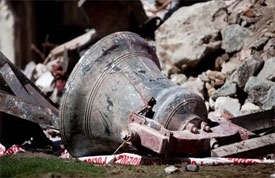Quake-hit New Zealand takes axe to public services
 |
| A church bell lies amid the rubble of quake-smashed Christchurch Cathedral in the centre of the city. New Zealand has said it would cut public service spending and partially privatise state-owned assets to help pay for devastating earthquakes and kickstart the flagging economy.- AFP |
Unveiling his annual budget, Finance Minister Bill English said the damage from the quakes in September and February was NZ$15 billion ($11.8 billion), equivalent to eight per cent of New Zealand's gross domestic product (GDP).
"It's difficult to find a natural disaster that's had a bigger impact on any country," he told reporters, adding that estimates put the damage from Japan's earthquake and tsunami disaster at 3-5 per cent of Tokyo's GDP.
English said the government's portion of the repair bill was NZ$8.8 billion, forcing cuts to the public sector, retirement savings and middle-class welfare as part of a wider strategy to make the economy more efficient.
He said the Christchurch quakes, the second of which claimed 181 lives, had stalled a fragile recovery and it was vital to New Zealand's economic health that the city was swiftly rebuilt.
"Christchurch is not only our second-largest city, it is also a major industrial, tourism and regional hub, and is therefore essential to the performance of the wider economy," he said.
English said that despite the mammoth earthquake repair bill, the budget would return to surplus in 2014/15, a year earlier than previously forecast, after plunging to a record NZ$16.7 billion deficit in 2010/11.
"From the depths of the global financial crisis, when a decade of red ink was in prospect, and despite the devastating Canterbury earthquakes and other setbacks, the government has laid the basis for future prosperity," he said.
As a result, he said the conservative National Party-led government could not afford to include vote-winning sweeteners in the budget ahead of a general election on November 26.
Instead, the government would seek savings of NZ$5.2 billion over five years, around NZ$3.1 billion of which would be redirected to boost health and education.
English also announced plans to raise NZ$5-7 billion by further reducing the government's 74.6 per cent stake in Air New Zealand and partially privatising four state-owned energy assets.
About NZ$1 billion in cuts would come from the public service, although English gave no estimate of potential job cuts.
He said the government would also halve its contribution to the Kiwisaver pension scheme, while increasing the amount that workers and employers pay.
Other cuts included focusing a welfare scheme for families on low-income earners and tightening the government's interest-free loan scheme for students.
The budget figures assume the economy, which narrowly avoided dipping into recession in late 2010, will grow almost three per cent a year over the next four years.
Standard & Poor's maintained a negative outlook on New Zealand's AA+ rating, saying it was important the government met fiscal targets outlined in the budget to avoid a downgrade.
"New Zealand's credit quality is weakened by its high external liabilities, despite some deleveraging in recent years," the agency said in a statement.
What the stars mean:
★ Poor ★ ★ Promising ★★★ Good ★★★★ Very good ★★★★★ Exceptional
 Tag:
Tag:
Related Contents
Latest News
More News
- Russian President congratulates Vietnamese Party leader during phone talks (January 25, 2026 | 09:58)
- Worldwide congratulations underscore confidence in Vietnam’s 14th Party Congress (January 23, 2026 | 09:02)
- Political parties, organisations, int’l friends send congratulations to 14th National Party Congress (January 22, 2026 | 09:33)
- 14th National Party Congress: Japanese media highlight Vietnam’s growth targets (January 21, 2026 | 09:46)
- 14th National Party Congress: Driving force for Vietnam to continue renewal, innovation, breakthroughs (January 21, 2026 | 09:42)
- Vietnam remains spiritual support for progressive forces: Colombian party leader (January 21, 2026 | 08:00)
- Int'l media provides large coverage of 14th National Party Congress's first working day (January 20, 2026 | 09:09)
- Vietnamese firms win top honours at ASEAN Digital Awards (January 16, 2026 | 16:45)
- ASEAN Digital Ministers' Meeting opens in Hanoi (January 15, 2026 | 15:33)
- ASEAN economies move up the global chip value chain (December 09, 2025 | 13:32)






















 Mobile Version
Mobile Version